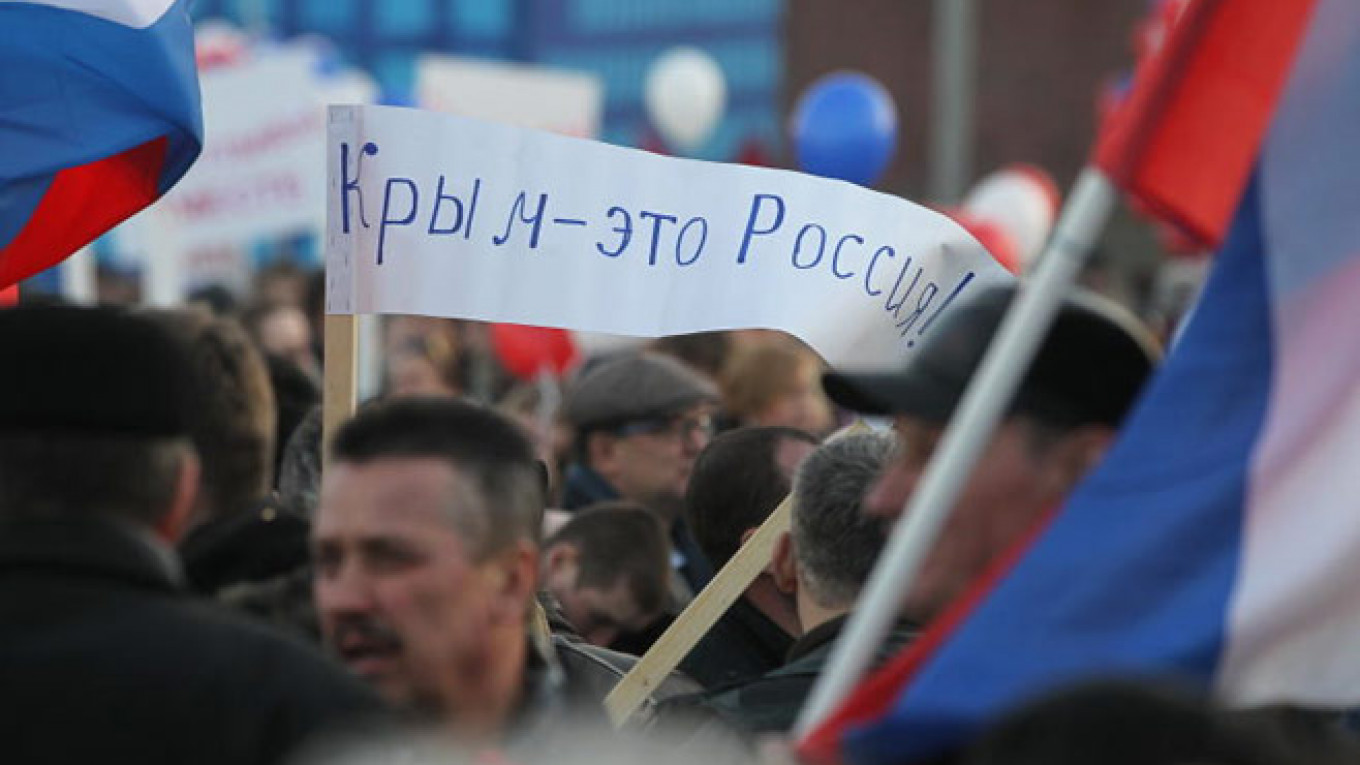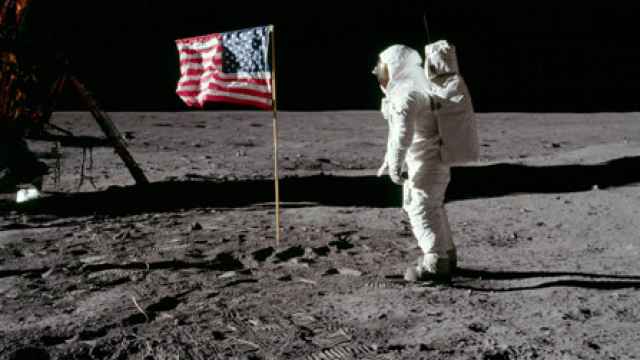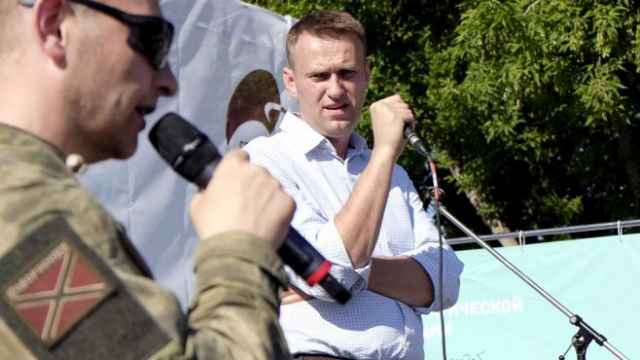NATO made its move in the pre-World War III poker game with Russia this week, meeting Moscow's recent stake of 40 intercontinental missiles with a batch of tanks slated for deployment on the alliance's eastern borders. European bailiffs also began seizing Russian state property in the European Union over that gargantuan lawsuit that Russia lost to Yukos shareholders; in return, Russia threatened to ban Western flowers and chocolate imports.
All of this would be the news of the week if Washington and Moscow could keep their poker faces straight. But when they fight with both chocolate and weapons (and flowers), it is not really scary. If you were really going to nuke them, would they care about their Snickers sales?
So let's wait and see if they can settle on a weapon of choice (daisies?). Meanwhile, the news this week spanned beyond the Homo sapiens.
Don't Shoot the Troll
The villain of the week was consumer rights campaigner Mikhail Anshakov, who had the gall to publish a warning to Russians going to Crimea, reminding them that this could land them in trouble with Ukraine and the EU. The response was swift and merciless: The site for Anshakov's watchdog was blacklisted, the prosecutors opened a case, and President Vladimir Putin himself descended from the cloud to say that it was clearly an act of a foreign agent.
Russia is notorious for its pro-Kremlin "troll factories," but Anshakov is the nation's best troll, though on the other side of the political fence. It was his watchdog, for example, that tried to get merchants kicked out of the Christ the Savior Cathedral.
The merchants stayed, along with the car wash and the scantily clad girls that grace the parties in the cathedral's basement. (What God can't see won't hurt Him, right?) But you've got to give him credit for trying; I'm sure Jesus does.
The Crimea warning, essentially, was just that: a fine piece of trolling. Simply because — elephant in the room here — Crimea joining Russia was indeed not recognized by Ukraine, or the EU, or anyone else except North Korea, Afghanistan and their buddies. Russia does its best to forget that, and the war in the Donbass was a fine (if costly) distraction technique — but the issue is still there, and will not go away even if Anshakov is tarred and feathered.
So don't shoot the messenger, even if he's a troll.
Gas, Not Cucumbers
On the other side of the continent, a Chinese invasion was barely averted. It took the shape of China trying to lease a chunk of Siberian land roughly half the size of Moscow to plant their cucumbers and crops there — like they do across the world, from Ukraine to Brazil.
The vigilant Russian public saw the plan for what it was, which was — apparently — a disguised invasion. The outcry rose to the heavens, and even reached the local governor, who quickly denied the Chinese their cucumbers, saying that the deal was tentative and won't happen, probably.
But let's see if we got the facts right. Russia does not want to lease land to Chinese farmers, who are already toiling in Siberia and the Russian Far East in their multitudes. Yet at the same time, Russia is perfectly ready to fund two pipelines to China, worth at least $100 billion.
The gas deal is slated to pay off around the same time as the colonization of Uranus, given that China needs exactly 0 cubic meters of Russian gas (Angola and the Arabs have got it covered) and that Gazprom, which already struggles to find buyers for its gas worldwide, will have no other clients for those two pipes.
Back in the dark pre-Internet age, state power was manifested through land grabs (Crimea, anyone?). But in this century, people — including the Chinese — prefer to stick to soft power and/or economic dominance. Besides, the Chinese had 3,000 years to conquer Siberia, and never did; why do it now, when they're getting its best natural resources already?
Perhaps Russia should lease them its cabbage patches, and review the gas pipe contracts.
Horses and Asses
Chechen leader Ramzan Kadyrov has done the unthinkable and become a rights campaigner. But that's horses' rights, not human rights, don't worry: Kadyrov's racehorses stabled in Prague were hit by anti-Russian sanctions — Czech officials froze their winnings.
The dear Chechen leader said it was a violation of horses' rights that would have (his words) made Alexander the Great's horse turn in its horsey grave. As usual, he hinted at killing someone, but said that in the end, the horses will sort it out themselves.
Curiously, there were no racehorses in Kadyrov's latest income declaration, despite media allegations that he has about 50 stallions worth up to $2.5 million per noble steed. But surely he stands for horses' rights in general, not just his horses. It is also unclear how arresting winnings violates steeds' rights — perhaps they get a cut? But still, very noble, very laudable.
It is probably a bad time to bring up the recent pogrom at a human rights group's office in Grozny, and Kadyrov's general track record on the subject. But surely he can move from horses, asses and other quadrupeds to primates and, eventually, the Homo sapiens, protecting the species as he does his horses.
Yup. Any time now.
Unfair Observer is the pen name of a Russian journalist that The Moscow Times has invited to observe the most brain-dead weekly developments in Russia.
A Message from The Moscow Times:
Dear readers,
We are facing unprecedented challenges. Russia's Prosecutor General's Office has designated The Moscow Times as an "undesirable" organization, criminalizing our work and putting our staff at risk of prosecution. This follows our earlier unjust labeling as a "foreign agent."
These actions are direct attempts to silence independent journalism in Russia. The authorities claim our work "discredits the decisions of the Russian leadership." We see things differently: we strive to provide accurate, unbiased reporting on Russia.
We, the journalists of The Moscow Times, refuse to be silenced. But to continue our work, we need your help.
Your support, no matter how small, makes a world of difference. If you can, please support us monthly starting from just $2. It's quick to set up, and every contribution makes a significant impact.
By supporting The Moscow Times, you're defending open, independent journalism in the face of repression. Thank you for standing with us.
Remind me later.






